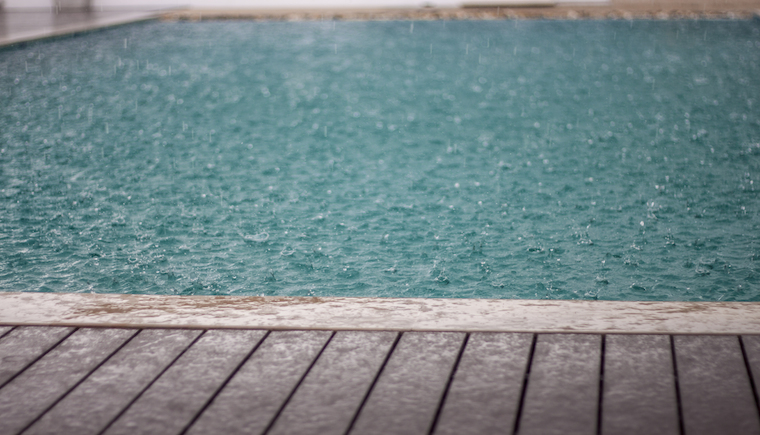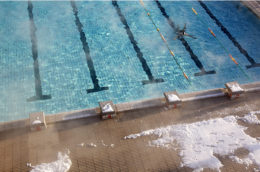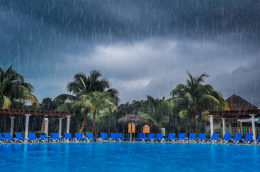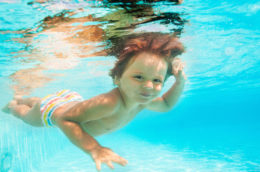Summer is coming to an end and as the colder weather starts rolling in most…

How Does Rainy Weather Affect My Pool Water?
Ah, summer—warm weather, enjoying the pool with friends and family, and, of course, summer storms. In some states, summer can bring storms almost daily. So what does this do to the chemistry in your swimming pool? We are glad you asked. Let’s talk a bit about how rain water affects your pool water, and what you can do about it.First, to answer your question, rainy weather can definitely have an adverse effect on you swimming pool water. It may come as a surprise, but the problems caused by rain do not result from dilution of the chemicals in your pool water. An inch of rainwater added to a typical 20,000 gallon pool (surface area of about 670 sq. ft.) increases the amount of water by only about 2%*. Therefore, dilution is not usually an issue.
The rub is in what piggybacks on those raindrops: algae spores and airborne debris. Rain delivers algae spores and debris to pool water and it is these things that cause problems. Algae spores are usually present in the air. Riding the air currents hither and yon in order to sometimes land in hospitable locations is part of algae’s reproductive strategy. When it rains, spores and other material in the air above a swimming pool get washed into the water. Other spores on surrounding vegetation or on the ground, along with other debris, also wash into the pool water.
The soup of algae and other organic material that rain brings to your pool water must be dealt with, or you will not have a happy swimming experience. All of this material reacts with your pool chlorine and so reduces the active chlorine level in the water. As if that’s not bad enough, when the organic matter decomposes it provides fuel for the growth and reproduction of algae and other simple organisms in the water. Combined with a little sunlight—especially in warm water— the conditions become ripe for accelerated growth of algae in the pool.
So, what to do? The solution is to make sure that the rate at which the algae in your pool are being killed is faster than the rate at which they are reproducing. And that means keeping your sanitizer level up in the proper range and adding algicide promptly. We recommend a copper-based algicide like Lo-Chlor 90 Day Algicide, because it is impervious to decomposition by chlorine and sunlight and persists in its role as an algae killer.
The debris added to the pool with rainfall can also affect the pool water chemistry. For this reason, it is important that you test your water after it rains and re-balance it if necessary. If the Total Alkalinity of your pool water is in the proper range, then the pH of the rainwater will not, in itself, significantly affect your pool water balance.
So no, rain is not a swimmer’s friend, as it can ultimately turn your pool water into an unappealing breeding ground for algae, and can alter the all-important water chemistry. However, testing your water after each rainfall and adding Lo-Chlor 90 Day Algicide promptly will help you win the battle, keeping your water sparkling clean and never green!
To read more about algae, click here.
Please leave us any questions or comments you may have. We love hearing from you!
* In the U.S. the average annual rainfall is 30” for the contiguous 48 states but, of course, it varies widely by region and season.




It is, indeed, possible for the poor air quality that you describe to induce rapid algae growth in pool water. There are two mechanisms likely at work and both would be launched by fine particles of ash and other partially oxidized debris finding their way into the pool water. These particulates, once in the water, will be partially oxidized by the chlorine in your pool. As a result, the chlorine activity in the water will be reduced and so a window of opportunity is created, until the chlorine in the pool is replenished, for unhindered algae and pathogen growth.
The second mechanism is the partially oxidized ash and debris acting as nutrients for the algae. Algae are plants and so in addition to sunlight, water and carbon dioxide they require nutrients for growth and reproduction. The ash and other fine debris can serve that function.
So, in your circumstances we recommend several measures. Be attentive to the chlorine level in your pool, make sure that you filter is cleaned or backflushed regularly so that it properly removes filterable debris from the pool water, use an enzyme product weekly to destroy organic debris in the water (we make Ultra Zyme Pro and Lo-Phos E+ for this purpose), and check your pool for phosphates and use a phosphate reducing product if needed (we make Lo-Phos Max and Lo-Phos E+ for this purpose).
We hope you remain safe throughout these challenging environmental conditions.
Thanks to the author for sharing such a great post. The article was very well written and providing great info about how does rainy weather affect my pool water!! It can be really great for people like me who are looking to get such kind of more knowledge about it.
We’re glad to help!